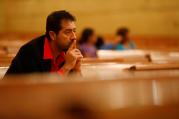Click here if you don’t see subscription options





Ignatian Perspective
The article A Veteran Remembers, by James R. Conroy, S.J., (8/1) offers an excellent perspective on the war in Iraq. By calling attention to the disproportionately large number of African-Americans and Hispanics who are serving and dying there, he asks us all to consider whether or not this really is our nation’s war. In addition, his reflections on his experience in Vietnam (first as a soldier and recently as a pilgrim) are the clearest examples I have seen of an Ignatian perspective on one’s own experience. If we are immersed in the work of living in the present, it will always be messy. I appreciate Father Conroy’s reminder of this.
Thomas J. Brennan, S.J.

Regard to Decorum
Much of what James F. Gill says in his article, Advice and Consent (10/31) concerning the proper role of the Senate in passing upon presidential appointments to the Supreme Court is incontestable; but his view that the Senate should confine its inquiry to questions of integrity, intelligence, experience and the like and pass over questions of ideology is not. The difficulty, of course, arises because the Supreme Court, rightly or wrongly, has taken control of a wide array of important and contentious social and political issues such as abortion, birth control, homosexual intercourse, differential treatment of gays and women, and voting rights. Moreover, given the potential sweep of the privacy rights that the court has discovered in the penumbra of the Bill of Rights, more may well be on the way, depending very much on the makeup of the court.
When the presidency and the Senate are in the hands of a single party, there is normally no problem barring a filibusterwhich has no support in the Constitution and which can be overridden when the majority sees fit to do so. But when control of the presidency and the Senate is divided, reflecting a like division among voters on important issues within reach of the court, then I suggest it is far from clear that the public interest is best served by leaving the president free to put control of the court in the hands of justices whom he is persuaded will reflect his views on such issues rather than the contrary views of the majority of the Senate.
Whatever the opinions expressed during the Constitutional Convention, the text of the Constitution does not support or even suggest such a narrow senatorial role, nor could the framers have anticipated the vast expansion of judicial power that has taken place since their time. And the effect of such unconfined presidential power is greatly amplified by the fact that the composition of the court may be essentially unchanged for decadeswitness the current court before Chief Justice Rehnquist’s deathirrespective of decisive intervening changes in the control of the elective branches.
It would be much less messy, to be sure, if senators would look only at a nominee’s qualifications of mind and experience; and surely they should not seek to learn how a nominee would vote on a particular issue likely to arise before the court. But I, for one, hope my senators would vote against a nominee who, for example, had authored a lower court opinion or an article endorsing the expansion of the right to privacy to gay marriage; and I would expect and support the right of senators of contrary view to embrace such a nominee.
In a sense, this contentious situation has been forced upon all of us by the Supreme Court itself by way of its Roe v. Wade decision. But that’s where we are, much as we might like a return to the good old days. Since each party now takes either a wide or narrow view of the senatorial role, depending on who’s in control, and since plainly neither is going to change, it seems to me we might as well relax and confine ourselves to insisting that the Senators act with a decent regard to decorum. That’s challenge enough, it seems to me.
William H. Dempsey




